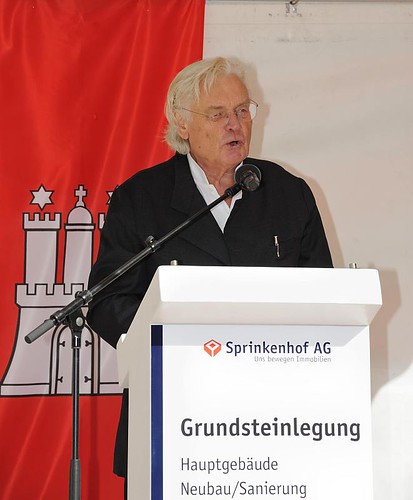
7728 Grundsteinlegung Hauptgebäude TUHH - Prof. Meinhard Gerkan - Hamburger Architekturbüro von Gerkan, Marg und Partner., originally uploaded by christoph_bellin.
Meinhard von Gerkan, the German architect has designed the world's biggest museum, the National Museum of China on Tiananmen Square.
SPIEGEL: Mr. von Gerkan, two days after the opening of the first show at the National Museum, the Chinese artist Ai Weiwei was arrested at the Beijing airport. What was your first thought?
Gerkan: Without knowing it, I was at the airport at the same time. Because our flight was overbooked, we had to fly back to Germany on Foreign Minister Guido Westerwelle's plane. Westerwelle had been at the show's opening. We found out about Ai's arrest during the flight.
SPIEGEL: His arrest has shown, once again, that the Chinese government harasses dissidents. Because of incidents like this, Germans who work with Chinese officials have also come under fire. What is your response to such charges?
Gerkan: It's a charge that you are making, here and now. But it doesn't mean that others are making it.
SPIEGEL: Perhaps you could take a look at the German media -- publications like the Frankfurter Allgemeine Zeitung newspaper or the weekly magazine Stern?
Gerkan: Of course I was shocked by Ai's arrest. I have great respect for him as an artist, and I could imagine working with him. A friend of mine knows him well. Ai is deliberately provocative, probably because he thinks that he can achieve something with that approach.
SPIEGEL: How do you interpret the arrest?
Gerkan: Let's put it this way: The arrest is a heavy setback for everyone who believes in a gradual opening of the country through an exhibition like "The Art of the Enlightenment." During this visit to Beijing, we were under the impression that the Chinese were rather nervous. This must have something to do with the events in North Africa, particularly in Libya.
SPIEGEL: Courageous people are also protesting in China.
Gerkan: Instead of bringing calm to the situation, actions like Ai's arrest will only incite the protesters even further. I don't understand the Chinese in this regard.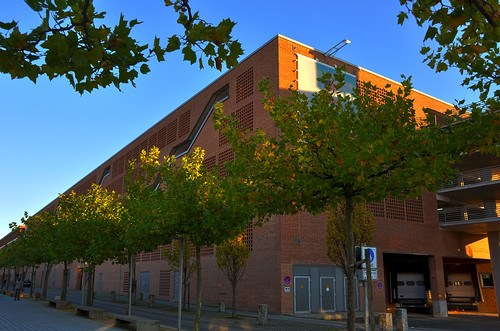
SPIEGEL: Is it also evidence of the nervousness of Chinese officials that you, as the key architect, were not allowed to give a speech at the opening of the exhibition?
Gerkan: Our ambassador tried to convince the Chinese to let me say a few words, but they didn't want it. They didn't say why. I think it's because they preferred to talk themselves.
SPIEGEL: What would you have liked to say?
Gerkan: I would like to have pointed out that it was a German architecture firm that planned the building, because this isn't very well known in China.
SPIEGEL: Why do you build in China, a country with such a restrictive leadership?
Gerkan: China has changed rapidly since I began my first project 13 years ago, the German school in Beijing. There is no question that there are still many deplorable incidents, but one thing is clear: Never in Chinese history has there been this much freedom for the individual. Even though there are millions of poor farmers, it is remarkable that no one is starving in China.
SPIEGEL: There may have been progress in the last 100 years, but the situation has gotten worse recently. Regime critics are now tortured and imprisoned. Why do you cooperate with the people in charge?
Gerkan: That sounds so conspiratorial. To be honest, I often sit at a table with Chinese politicians and have no idea who is responsible for what. (Former German Chancellor) Willy Brandt said that change is possible through rapprochement, not through embargoes.
SPIEGEL: The former chancellor was referring to his eastern policy and to the relationship between the former Federal Republic of Germany and East Germany. If you had been offered the job of building the People's Parliament in East Germany 40 years ago, what would you have said?
Gerkan: I wouldn't have built it. Believe me, there is a big difference between East Germany and today's China. I experienced the East German system up close, because I studied in Berlin. What I experienced at the time -- the level of inhuman behavior -- doesn't exist in China by a long shot.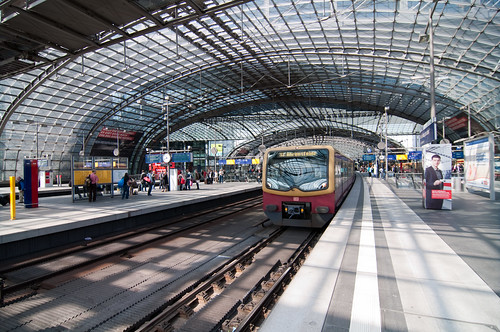
SPIEGEL: Ai Weiwei, the imprisoned Nobel Peace Prize winner Liu Xiaobo and many others in similar positions would probably disagree.
Gerkan: There are 70 people working in our office in Beijing, many of them Chinese. We can discuss all sensitive issues.
SPIEGEL: But you know that some of your Chinese employees are required to report their conversations with the Germans to the intelligence service?
Gerkan: That's a preconception.
SPIEGEL: No, it's common knowledge.
Gerkan: You know, I experienced the Soviet regime. I was with my wife in Moscow and Riga, and we were constantly shadowed during our stay. When we went to a restaurant, a woman we didn't know would suddenly sit down at the same table. There is no comparison between all that and what I've seen in China over the last 10 years.
SPIEGEL: The National Museum, which you designed, is a showpiece building for the Chinese regime. It is on Tiananmen Square, where the Chinese government had its security forces massacre thousands of students in 1989. Were there any ideas during the planning phase to address the specific history of the square in the design?
Gerkan: Not at all.
SPIEGEL: The square, as a historically tainted setting, played no role in the design? Didn't you want to show a visual counterpoint?
Gerkan: No. The square played no role at all. That wasn't the assignment. We were asked to build a museum that would serve as a window into China's 5,000-year-old history, a building that houses a million pieces of art and can handle 20,000 visitors at the same time. The assignment was to expand a structure built in 1959 as carefully and respectfully as possible.
SPIEGEL: But the square is historically contaminated.
Gerkan: Based on that argument, one would have to conclude that no one should be allowed to build in Germany anymore, either. Germany as a whole is contaminated.
'Who Says that One Should not Be Allowed to Build There?'
SPIEGEL: But in our case there was a change in the power structure, while there hasn't been one in China since 1989.
Gerkan: Oh, really? So you can decontaminate a place again?
SPIEGEL: The address of your office in Hamburg, Elbchaussee 139, is not viewed as a contaminated place by the global public. But Tiananmen Square is.
Gerkan: As Germany's most respected news magazine, what do you gain from slamming the best-known architecture firm in Germany? Your questions are malicious.
SPIEGEL: Our questions are critical. Our goal is not to question the undeniable quality of your architecture. Let's turn the question around: What do you gain from placing a showpiece building for the Chinese government in this horrible and historically burdened location? You could jeopardize your excellent reputation as an architect.
Gerkan: Who says that one should not be allowed to build there? Or that one has to build in such a way that the structure relates to the history of the square? How can you portray this view as being unalterably correct?
SPIEGEL: There are three positions among German architects: not to build in China at all, only to work for private developers or to accept government contracts, which sends a certain message. You are a proponent of the third view, which is certainly controversial.
Gerkan: Of course! Architects never like more successful architects. It's like the fable of the fox and the sour grapes. Those who can't reach the grapes say they don't want to eat them, claiming that they don't taste good.
SPIEGEL: The criticism also comes from successful architects, not just unsuccessful ones.
Gerkan: This idea of only wanting to work for private individuals is absurd. In a country like China, where does private end and where does government-owned begin? Private citizens turn out to be aligned with the government, or a private developer obtains government financing for his building. For architects like us, this is almost impossible to figure out. Many of those who criticize us are building the five-hundredth high-rise building in China and claim to have integrity. This is a fallacy.
SPIEGEL: Would you continue to build symbolic structures in China in the future?
Gerkan: Of course. You shouldn't overestimate the social role and function of an architect -- even when he plays a somewhat bigger role in the public's perception, as I do. An architect has a limited ability to influence things.
SPIEGEL: Now you are being very modest.
Gerkan: I think it's naïve and implausible to stand there and crow: "I don't build, so I can't be doing anything wrong."
SPIEGEL: Many architects refuse.
Gerkan: And many architects don't refuse. The German architecture firm KSP Engel & Zimmermann built the national library in Beijing. Our museum is a moderate structure that blends into the surroundings.
SPIEGEL: That's exactly the problem. It blends in because it's hiding behind an old façade of totalitarian architecture. We can't imagine that this is in line with your aesthetic principles.
Gerkan: We make no secret of the fact that this entire ensemble is not typical for us. But it's also erroneous to say that the architect must realize his potential in every building. Architecture must primarily react to the location. If there is anything that can be seen as supporting the regime, it's a building like the CCTV (editor's note: state broadcaster China Central Television) headquarters in Beijing.
SPIEGEL: You would turn down an offer to give a modern façade to a propaganda TV station, a contract your Dutch colleague Rem Koolhaas accepted?
Gerkan: We are also building a television station, and it's even bigger. But it's also different. The Koolhaas building is horrible, unfunctional, insulting to the city and arrogant. It toys with the Chinese ambition to be more avant-garde than everyone else.
SPIEGEL: In the 2004 competition for the National Museum, you prevailed over 10 other world-famous architects with a sensational design. Initially, you wanted to place a modern bronze roof over the historic façade that would have mirrored the Forbidden City. The museum has been built, but the heart of the design, the roof, is gone.
Gerkan: It's painful, of course. But shortly after we had won the competition, Chinese architects were suddenly asking: Why are Germans building our national museum? The Chinese architects' complaint was taken seriously and then lifted to a supposedly objective level. The clients suddenly expressed concern that our roof would devalue the 1959 façade. They were also afraid that the building wasn't sufficiently Chinese.
SPIEGEL: You see! Why did you accept the objections? You are, after all, a temperamental and forceful man.
Gerkan: I still remember sitting with my partner, Stephan Schütz, in the hotel room in Beijing. We spent the entire night talking about how we should respond, and we asked ourselves what our limit should be and to what extent we could allow our design to be compromised.
SPIEGEL: When Deutsche Bahn, for which you built the main train station in Berlin, ruined your ceiling, you answered that question quite clearly. You sued, and you were successful in an initial court ruling. Are you building in China under conditions that you would never accept in Germany?
Gerkan: In the case of the Berlin train station, Deutsche Bahn grossly violated my copyright behind my back. In the case of the National Museum in Beijing, the changes were part of a discursive process.
SPIEGEL: Did your Chinese clients feel that the building was Chinese enough?
Gerkan: Yes, we were showered with praise, and the Chinese were very pleased with the museum. There are many Chinese design elements in the clear structure, such as the stone base, which always appears in Chinese temple architecture, and the use of traditional cherry wood.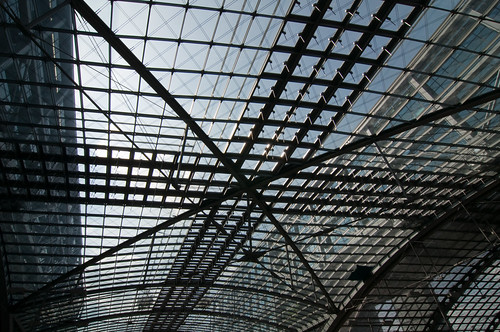
SPIEGEL: You currently have about 50 projects underway in China. Many of your German colleagues complain that after taking part in competitions in China, they never hear anything again and eventually see their designs being implemented without ever having been paid anything. Have you also been robbed?
Gerkan: Just last week, we happened to see our design for a convention center in Wuhan in central China on the Internet. Now someone else is planning the construction. The convention center is unmistakable, because it's circular with an entrance from the inside. We had submitted our design in a competition and didn't even get any feedback. Unfortunately, there is nothing you can do about this sort of thing.
SPIEGEL: Why?
Gerkan: When we designed a financial center on the third ring road in Beijing, we were told, more or less clearly, that Chinese architects could execute it at a lower cost. The building is now up -- more or less the way we had designed it -- but it's ugly. Like a chicken after its most beautiful feathers have been plucked.
SPIEGEL: Did you sue?
Gerkan: We wanted to at first. At the time, we were still naïve enough to believe that we could achieve something by legal means. We contacted the former German ambassador, who now runs a law firm in Beijing. He said to us: "The client is a tycoon from Hong Kong who controls the entire building industry. If you sue him, you'll never get another contract." Fortunately these are rare, isolated cases.
SPIEGEL: But the Chinese are prompt when it comes to payment?
Gerkan: At least they're more prompt than Deutsche Bahn.
SPIEGEL: Mr. von Gerkan, thank you for this interview.
Interview conducted by Susanne Beyer, Martin Doerry and Nora Reinhardt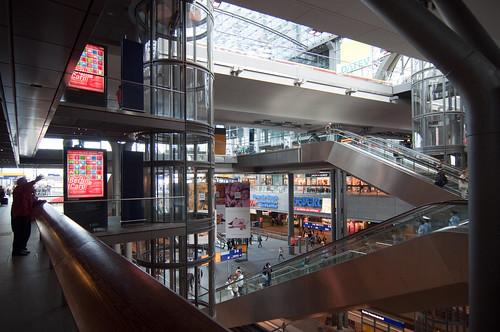
Niciun comentariu:
Trimiteți un comentariu